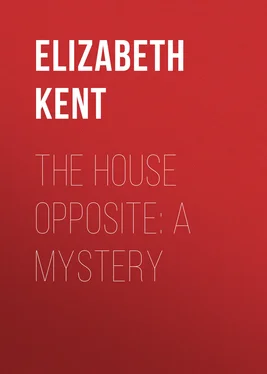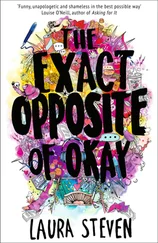Elizabeth Kent - The House Opposite - A Mystery
Здесь есть возможность читать онлайн «Elizabeth Kent - The House Opposite - A Mystery» — ознакомительный отрывок электронной книги совершенно бесплатно, а после прочтения отрывка купить полную версию. В некоторых случаях можно слушать аудио, скачать через торрент в формате fb2 и присутствует краткое содержание. Жанр: foreign_prose, foreign_antique, на английском языке. Описание произведения, (предисловие) а так же отзывы посетителей доступны на портале библиотеки ЛибКат.
- Название:The House Opposite: A Mystery
- Автор:
- Жанр:
- Год:неизвестен
- ISBN:нет данных
- Рейтинг книги:3 / 5. Голосов: 1
-
Избранное:Добавить в избранное
- Отзывы:
-
Ваша оценка:
- 60
- 1
- 2
- 3
- 4
- 5
The House Opposite: A Mystery: краткое содержание, описание и аннотация
Предлагаем к чтению аннотацию, описание, краткое содержание или предисловие (зависит от того, что написал сам автор книги «The House Opposite: A Mystery»). Если вы не нашли необходимую информацию о книге — напишите в комментариях, мы постараемся отыскать её.
The House Opposite: A Mystery — читать онлайн ознакомительный отрывок
Ниже представлен текст книги, разбитый по страницам. Система сохранения места последней прочитанной страницы, позволяет с удобством читать онлайн бесплатно книгу «The House Opposite: A Mystery», без необходимости каждый раз заново искать на чём Вы остановились. Поставьте закладку, и сможете в любой момент перейти на страницу, на которой закончили чтение.
Интервал:
Закладка:
Apparently the Coroner was not completely satisfied, for he went on: “You know that this man has been murdered, and that it is your duty to give us any information that might lead to his identification. Have you seen any suspicious persons about the building during the last few days?”
“No, sar; nobody,”—but I thought he had hesitated an instant before answering.
“You must see a good many people pass up and down the back stairs,” the detective remarked; “especially in this hot weather, when you must be obliged to leave the kitchen door open a good deal so as to get a draught.”
The man cast a hurried, and I thought an apprehensive, glance at Mr. Merritt, and replied quickly: “Yes, sar; ze door is open almos’ all ze time, but I ’ave seen nobody.”
“Nobody?” repeated the detective.
“Yes, sar,” Argot asserted, still more emphatically. “No vone, excep’ ze butchair, ze bakair, and ze ozer tradesmen, of course.”
“How early are you likely to open the kitchen door? To leave it open, I mean?”
“Oh, not till eight o’clock, perhap—Madame Argot, she stay in déshabille till zen.”
“What time do you go to bed?”
“At ten o’clock generally, but some time eleven o’clock—even midnight—it depens.”
“What time did you go to bed on Tuesday?”
“At eleven, sar.”
“What had you been doing during the evening?”
“I had been at a restaurant wiz some friends.”
“And when did you return?”
“At about half-pas’ ten.”
“Did you come in the back way?”
“Yes, sar.”
“How did you get in?”
“My wife, she open ze door.”
“And you saw nobody as you came in?”
He paused almost imperceptibly. “No, sar,” he answered. But I was now convinced that he was holding something back.
“Very well; you can go,” said the Coroner. The fellow bowed himself out with a good deal of quiet dignity.
“I kinder fancy that man knows something he won’t tell,” said the Coroner. “Now, we’ve seen every one but the workmen,” he continued, wearily, mopping his forehead. “I don’t believe one of them knows a thing; still, I’ve got to go through with it, I suppose,” and going to the door he beckoned them all in.
There were five of them, including the foreman, and they appeared to be quiet, respectable young men. After looking at the dead man intently for some minutes, they all asserted that they had never laid eyes on him before.
“Now have any of you noticed during the three days you have been working here anybody who might have taken the key, kept it for some hours, and returned it without your noticing it?” inquired the Coroner.
“We’ve seen no strangers,” the foreman replied, cautiously.
“Who have you seen?” The foreman was evidently prepared for this question.
“Well, sir, we’ve seen altogether six people: Jim, and Joe, and Tony, Mr. McGorry, Miss Derwent, and the Frinchman,” he replied, checking them off on his fingers.
“When did the Frenchman come up here?”
“Yistidy morning, sir; he said he come to see the decorations, and he come again about three; but he didn’t stay long. I warn’t a-going to have him hanging round here interfering!”
“Did any of his actions at the time strike you as suspicious?”
“No, sir,” acknowledged the foreman.
“And Miss Derwent; when did you see her?”
“I didn’t see her myself in the morning, but he”—with a nod towards one of the men,—“he saw her look in as she was waiting for the elevator, and in the afternoon she come right in.”
“Did she say anything?”
“Yes, sir; she said the paint and papers were mighty pretty.”
“When you saw Miss Derwent,” said the Coroner, addressing the man whom the foreman had pointed out, “what was she doing?”
“She was standing just inside the hall.”
“Was her hand on the door knob?”
“I didn’t notice, sir.”
“Did the young lady say anything?”
“When she saw me a-looking at her, she just said: ‘How pretty!’ and went away.”
“Have any of you seen Mr. or Mrs. Atkins, or either of their girls, since you have been working here?” They all replied in the negative.
The Coroner’s physician turned up at this juncture, with many apologies for his late arrival, so, having no further excuse for remaining, I took my leave. The lower hall swarmed with innumerable reporters, trying to force their way upstairs, and who were only prevented from doing so by the infuriated McGorry and two or three stalwart policemen. On catching sight of me they all fell upon me with one accord, and I only managed to escape by giving them the most detailed description of the corpse and professing complete ignorance as to everything else.
CHAPTER VI
A LETTER AND ITS ANSWER
WHEN I got back to my diggings I was astonished to find that it was only ten o’clock. How little time it takes to change the whole world for one! All day long I forced myself to go about my usual work, but the thought of May Derwent never left me.
It was the greatest relief to find that in none of the evening papers did her name appear. How McGorry managed to conceal from the reporters the fact that she had been in the building remains a mystery to this day—but how thankful I was that he was able to do so! Already my greatest preoccupation was to preserve her fair name from the least breath of scandal. Not for an instant did I believe her to be connected with the murder;—on the other hand, I felt equally sure that she was in some great trouble, the nature of which I could not even guess. I longed to protect and help her, but how was I to do so, ignorant as I was of everything concerning her. I didn’t even know where she was at that moment. At her mother’s, perhaps. But where was that? Suddenly I remembered that my great friend, Fred Cowper, had mentioned in one of his recent letters that Mrs. Derwent and his mother were near neighbours in the country. To think that that lucky dog had been spending the last month within a stone’s throw, perhaps, of her house—had seen her every day probably, and had been allowed these inestimable privileges simply because he had broken an old leg! And I, who would gladly have sacrificed both legs to have been in his place, was forced to remain in New York because—forsooth!—of an apoplectic old patient—who refused either to live or die! Well, as I couldn’t go to her, it was at any rate a comfort to be able to get news of her so easily—so seizing a pen, I hastily scratched off the following note:
New York, August 10, 1898.Dear Fred:
You know me pretty well and know therefore that I’m not a prying sort of fellow—don’t you? So that when I ask you to tell me all you know about Miss May Derwent—I hope you will believe that I am animated by no idle curiosity. A doctor is often forced to carry more secrets than a family solicitor, and is as much in honor bound. Through no fault of my own, I have come into the possession of certain facts relating to Miss Derwent which lead me to believe that she is in great trouble. Furthermore, I am convinced that I could help her, were I not handicapped by my very slight personal acquaintance with her, but more than that by my entire ignorance regarding certain details of her life. I might as well acknowledge that I am interested in the young lady, and am anxious to serve her if I can. But if I am to do so, I must first find out a few particulars of her life, and these I hope you can give me.
In the first place I want to know whether she has any young male relative who is tall, with good figure? I remember hearing that she is an only child, but has she no cousin with whom she is on terms of brotherly intimacy?
Читать дальшеИнтервал:
Закладка:
Похожие книги на «The House Opposite: A Mystery»
Представляем Вашему вниманию похожие книги на «The House Opposite: A Mystery» списком для выбора. Мы отобрали схожую по названию и смыслу литературу в надежде предоставить читателям больше вариантов отыскать новые, интересные, ещё непрочитанные произведения.
Обсуждение, отзывы о книге «The House Opposite: A Mystery» и просто собственные мнения читателей. Оставьте ваши комментарии, напишите, что Вы думаете о произведении, его смысле или главных героях. Укажите что конкретно понравилось, а что нет, и почему Вы так считаете.












